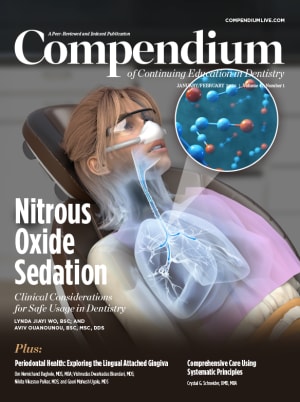Trabecular Metal™ Implant Advantageous for Treating Medically Compromised Patients, Sites
Although the oral health needs of every patient are unique, special consideration is warranted when treating medically compromised dental patients, such as persons with diabetes, heavy smokers, those with a history of prior infection at the implant site, or those affected by other factors that can lead to poor healing. For such cases, new treatment options are available that can promote faster healing, such as the Trabecular Metal™ Dental Implant from Zimmer Biomet. The proprietary Trabecular Metal Material is a biomaterial made from elemental tantalum with structural, functional, and physiological properties like those of bone.
Monish Bhola, DDS, MSD, a periodontist and current Director at Advanced Periodontics and Implant Institute in Detroit, Michigan, and former Director of Post-Graduate Periodontics at the University of Detroit Mercy School of Dentistry, 6 years ago was among the first clinicians in North America to test and place implants made with this unique material. "The technology came from the orthopedic world, where Zimmer Biomet had incorporated Trabecular Metal technology in its hip implants for certain medically compromised patients," Bhola explains. Trabecular Metal is not an implant surface or coating, but a 3-dimensional material.
The initial indication for this technology in dentistry, Bhola says, was in patients for whom it was not possible to place traditional implants due to poor bone quality. "These implants allow for high levels of bone-to-implant contact due to its unique structure," he states. "Therefore, in patients with poor bone quality, you get better secondary stability and faster healing." According to the manufacturer, the Trabecular Metal Dental Implant features an osteoconductive mid-section designed for bone ingrowth as well as ongrowth in a process called osseoincorporation, which refers to the healing potential of bone onto an implant surface and into an implant structure.
Bhola suggests that good bone-to-implant contact and the area that allows for bone ingrowth helps prevent the loss of stability that may often occur with traditional implants several weeks after placement. "Without that dip in stability, we are able to provide our patients a restoration much sooner," he says.
In his practice, Bhola has used the Trabecular Metal Dental Implant in the treatment of patients with previous oral health infections or whose bone healing was compromised. "These were risk management cases. In our experience over the past 5 to 6 years, we've seen that these implants have been very successful in situations where traditional implants might not work," he says.
The implant treatment can be further enhanced through the use of Zimmer Biomet's BellaTek® Encode® Impression System, Bhola adds. Once the Encode healing abutment is placed, the restorative dentist or surgeon can digitally scan the abutment or take a conventional impression, and all the necessary information is sent to an Encode-powered laboratory, where a custom abutment and crown can be made for the patient. This, he says, simplifies the whole restorative aspect of implant dentistry. "We don't have to remove the healing abutment until it is ready to be restored, so there is less chance of tissue collapsing."
Although Bhola is an advocate for innovative technologies into dentistry, he advises that, "The technology does not make up for a dentist's clinical judgement or certain other factors affecting patients. The Trabecular Metal technology gives us an edge in patients with poor healing, but we still have to do our due diligence," he says. For example, a practitioner must question a patient with diabetes to make sure his or her condition is under control before beginning any implant therapy.
"Our practice has an excellent 5-year track record with this implant," Bhola attests. "Our failure rate is very low-less than 1%. Trabecular Metal technology is certainly advantageous in the right clinical scenario."
Zimmer Biomet
800-342-5454
zimmerbiometdental.com
